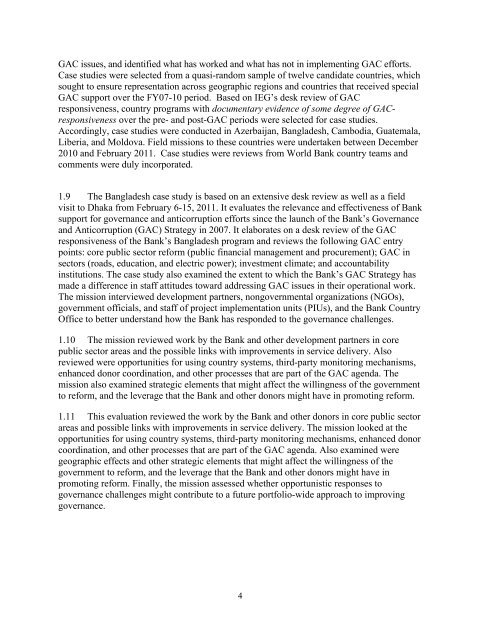Bangladesh - Independent Evaluation Group - World Bank
Bangladesh - Independent Evaluation Group - World Bank
Bangladesh - Independent Evaluation Group - World Bank
You also want an ePaper? Increase the reach of your titles
YUMPU automatically turns print PDFs into web optimized ePapers that Google loves.
GAC issues, and identified what has worked and what has not in implementing GAC efforts.<br />
Case studies were selected from a quasi-random sample of twelve candidate countries, which<br />
sought to ensure representation across geographic regions and countries that received special<br />
GAC support over the FY07-10 period. Based on IEG’s desk review of GAC<br />
responsiveness, country programs with documentary evidence of some degree of GACresponsiveness<br />
over the pre- and post-GAC periods were selected for case studies.<br />
Accordingly, case studies were conducted in Azerbaijan, <strong>Bangladesh</strong>, Cambodia, Guatemala,<br />
Liberia, and Moldova. Field missions to these countries were undertaken between December<br />
2010 and February 2011. Case studies were reviews from <strong>World</strong> <strong>Bank</strong> country teams and<br />
comments were duly incorporated.<br />
1.9 The <strong>Bangladesh</strong> case study is based on an extensive desk review as well as a field<br />
visit to Dhaka from February 6-15, 2011. It evaluates the relevance and effectiveness of <strong>Bank</strong><br />
support for governance and anticorruption efforts since the launch of the <strong>Bank</strong>’s Governance<br />
and Anticorruption (GAC) Strategy in 2007. It elaborates on a desk review of the GAC<br />
responsiveness of the <strong>Bank</strong>’s <strong>Bangladesh</strong> program and reviews the following GAC entry<br />
points: core public sector reform (public financial management and procurement); GAC in<br />
sectors (roads, education, and electric power); investment climate; and accountability<br />
institutions. The case study also examined the extent to which the <strong>Bank</strong>’s GAC Strategy has<br />
made a difference in staff attitudes toward addressing GAC issues in their operational work.<br />
The mission interviewed development partners, nongovernmental organizations (NGOs),<br />
government officials, and staff of project implementation units (PIUs), and the <strong>Bank</strong> Country<br />
Office to better understand how the <strong>Bank</strong> has responded to the governance challenges.<br />
1.10 The mission reviewed work by the <strong>Bank</strong> and other development partners in core<br />
public sector areas and the possible links with improvements in service delivery. Also<br />
reviewed were opportunities for using country systems, third-party monitoring mechanisms,<br />
enhanced donor coordination, and other processes that are part of the GAC agenda. The<br />
mission also examined strategic elements that might affect the willingness of the government<br />
to reform, and the leverage that the <strong>Bank</strong> and other donors might have in promoting reform.<br />
1.11 This evaluation reviewed the work by the <strong>Bank</strong> and other donors in core public sector<br />
areas and possible links with improvements in service delivery. The mission looked at the<br />
opportunities for using country systems, third-party monitoring mechanisms, enhanced donor<br />
coordination, and other processes that are part of the GAC agenda. Also examined were<br />
geographic effects and other strategic elements that might affect the willingness of the<br />
government to reform, and the leverage that the <strong>Bank</strong> and other donors might have in<br />
promoting reform. Finally, the mission assessed whether opportunistic responses to<br />
governance challenges might contribute to a future portfolio-wide approach to improving<br />
governance.<br />
4

















